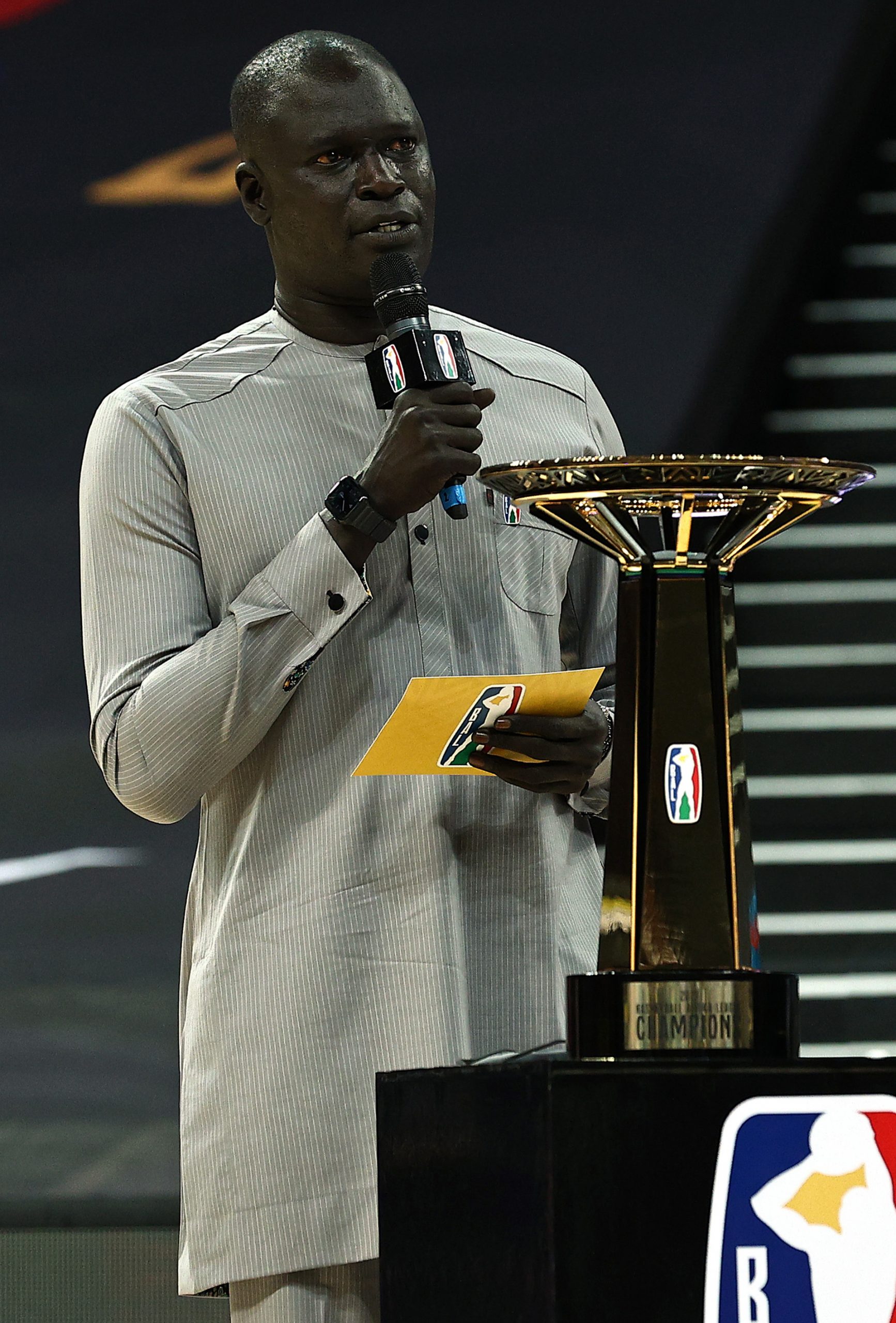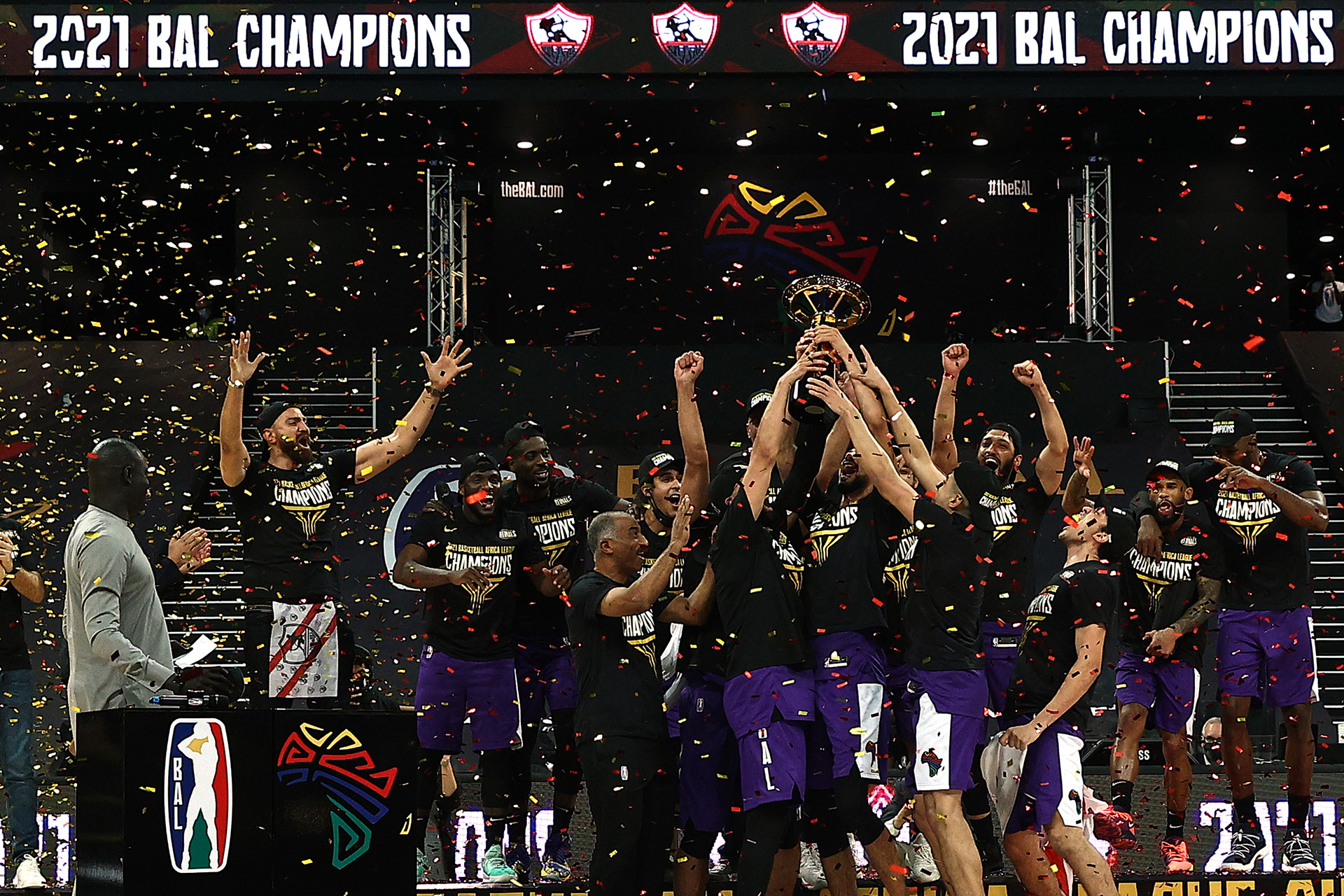The Basketball Africa League is Building Its Foundation for the Present and Future
As a young boy growing up in Senegal, Amadou Gallo Fall remembers first hearing the game of basketball being played over the airwaves coming from his radio at home. He didn’t have to see the game to visualize its beauty, and the dominance with which the Senegal Women’s National Basketball team played.
“I mean, there was a generation of players that were incredible,” Fall says of the female players of his era. “They won everything in Africa year after year.”
The Senegal team won the FIBA African Championship for Women (now known as the Afrobasket) from 1974-1993, a streak of sheer dominance not perpetuated by any single country in the continent since. Yet it wouldn’t be until the age of 17 that Fall, then 6-8, was truly introduced to the game. It wouldn’t be until he got to the States that basketball took its full effect on him and shifted his life’s work toward further expanding the infrastructure the game had within the continent.
Back in May of 2019, Fall was named President of the Basketball Africa League, a brand new partnership between FIBA and the NBA that featured 12 clubs from across Africa. Many of us in the States were tuning in to see our SLAM 232 cover athlete, J. Cole, get his first crack at the professional stage with the Rwandan Patriots.
However, the league’s successful launch this past May marks the beginning of a journey Gallo Fall, the NBA and FIBA have been working towards for decades.
“We launched Basketball Without Borders in 2003. And you see, appetite growing, and also obvious reasons why we should be more involved, because there was tremendous potential to grow the sport beyond just the individual players that were coming into NCAA schools, or even the NBA every year,” Fall tells SLAM.

Fall graduated magna cum laude with a bachelor’s in biology in 1997 from the University of District of Columbia, a historically black college with a Division II basketball program. He’s since helped lay the foundation of basketball within the continent to which the likes of Serge Ibaka, Pascal Siakam and Joel Embiid now stand upon.
In 2003, Fall helped to found the Basketball Without Borders program which has laid the pathway for African born players to make it to the League.
“He’s the godfather of the basketball community in Africa,” Loul Deng told The Undefeated back in June.
The BAL marks the first collaboration with the NBA to operate a professional league outside of North America, truly showcasing the level of potential the continent has to become one of the games most beloved fans.
“We have the talent on the continent, you know, like no place else,” Fall tells SLAM. “And you can see that from the presence of players from Africa in the NBA. So from a talent standpoint, you know, it’s a no brainer.”
The talent within the continent has always been top tier, but for Fall the next step is evolving the overall basketball ecosystem to catch up to the level of talent they possess. The League will always be there, but Fall hopes to retain the talent and resources that they’ve worked decades to help develop.
“We talk about this league being an economic growth engine,” says Fall. “It’s about seeing infrastructure develop, you know, both physical infrastructure with arenas, and all the amenities that you need to have like a world class type league. But also build capacity from an expertise standpoint.”
That’s where Victor Williams, the newly appointed NBA Africa CEO, comes in.
Williams first introduction to the game came at the Siaka Stevens Stadium in Freetown, Sierra Leone where he watched exhibition games of kids who’d come back from the US to showcase their newfound skills. Yet it wasn’t until he came to the United States for the first time that he was able to play the game for himself.
“And then my first memory of the game was watching the Lakers play on television when I first came to the US and I became a Lakers fan and I fell in love with the game from that,” Williams tells SLAM.
Out of pure instinct, Williams automatically begins rambling off the Showtime Lakers stars; Magic Johnson, Byron Scott, James Worthy, Kurt Rambis and Kareem Abdul-Jabbar, tossing in A.C. Green, Michael Cooper and Mychal Thompson for good measure.
“You could probably name the whole 12-man roster,” Amadou says to all of us on the Zoom call.
“I could!” Williams responds with a laugh.
“That’s just the kind of fan he is,” Amadou tells us.
Yet the reason Williams was brought into the NBA Africa fold – a new entity announced back in May that will conduct the League’s business in Africa – is the combination of his avid admiration for the game in concert with the vast corporate and business-growth knowledge he brings to the table.
For the past five years Williams had been serving as the Executive Head of Corporate and Investment Banking for Standard Bank of South Africa. Prior to that he spent time as Goldman Sachs’ VP of Investment Banking and as Securities Managing Director at Wells Fargo.
The wealth of knowledge Williams displays in regards to growing business lines across the continent is second to none. It’s clear on our Zoom call as he lays out the business enterprise he sees before him in the NBA Africa office in Johannesburg, South Africa.
“We talk of wanting to build a significant basketball and business enterprise on the African continent, that makes the NBA and the BAL among the top sports lifestyle brands on the continent, and to do so over the next 10 years,” Williams tells SLAM.
He talks of an ecosystem. One that Gallo Fall has been helping to build since the launch of the BWB program. Within it, NBA Africa allows children to be introduced to the game and receive fundamental coaching close to home. From there, Williams dreams of creating more infrastructure around the continent for talented individuals to continue to hone their craft with hopes of making a BAL roster, or even adding their name to the NBA Draft in the Spring.
In conjunction with FIBA, NBA Africa will work to better all facets of the game that has taken the heart of a continent. Coaching and referee developmental programs, continuing to foster NBA Academies and providing more indoor facilities to the public.
From a commercial perspective, Williams sees strong potential for basketball within the continent. Thanks to eight broadcast partnerships curated by Williams, Fall and the NBA Africa office, the BAL games over the summer reached 215 countries and territories in 15 different languages.
And then, in the midst of dropping a slew of knowledge, Williams drops us a perfectly placed dime, one with the potential for a show-stopping highlight.
“We want to bring more NBA games to the continent, preseason games, and maybe someday even a regular season (NBA) game so that people can attend games,” Williams shares with SLAM.
Less than a year after NBA commissioner Adam Silver expanded upon the plans to establish the BAL, Fall and the league announced several social justice initiatives that focus on raising awareness for gender-based violence, supporting women’s education, growing female participation in basketball and social economic inclusion.
“One of our commitments with the BAL is to take a leadership role wherever we do business in terms of addressing societal issues,” Fall explains. “Wherever we organize our BAL games, whichever country, as much as possible, we want to hire and do business with local companies, local providers, service providers. I think the BAL will give us an opportunity to apply that. How do, you know, engage with most small and medium enterprises that are looking to build capacity in the areas of merchandising, content productions, broadcast operations, and all this, the BAL gives us an opportunity to really live up to our social justice mission.”
Years of ambition, months of work through a pandemic and the contributions from investors like former NBA legends Dikembe Mutombo, Grant Hill, Loul Deng and Junior Bridgeman have brought Africa closer to cementing a world-recognized professional basketball league while advancing the talents and resources available to those that dream of having a basketball career.
Instead of coming to the states to become fully immersed in basketball culture, Gallo Fall and Williams are able to introduce the continent’s own hoop culture to children in their own backyard.
“Like a young player, no matter where they are on the continent, they can realistically dream about getting initiated into the game, playing at a grassroots level to making it to the pros, ultimately,” Fall says. “And I think, for me, the knock-out effect the BAL is going to have is strengthening the different national leagues across the continent, that’s what I’m most excited about. Because that’s where you’re going to really see true growth of the sport.”
